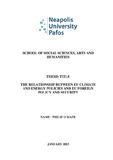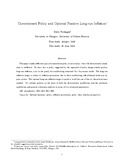| dc.contributor.advisor | Flouros, Floros | |
| dc.contributor.author | O’kane, Philip | |
| dc.date.accessioned | 2023-03-30T07:15:50Z | |
| dc.date.available | 2023-03-30T07:15:50Z | |
| dc.date.issued | 2023-01 | |
| dc.identifier.uri | http://hdl.handle.net/11728/12352 | |
| dc.description.abstract | The purpose of this study was to examine the evolution of climate change and energy
policy within the European Union and to evaluate how effective it has been in terms of
changing the policy of member states and also the impact of these EU policies on third
countries. This involved an examination of the foreign policy infrastructure of the EU and
analysis of the dynamics between EU climate change and energy policy, and the foreign
policy and security of the EU. Climate change and energy policy to meet climate targets is
an area of EU policy which is constantly evolving and developing, involving, as it does, all
aspects of EU foreign policy.
The extent and success of the National Energy & Climate Plans (NECPs) of EU member
states was therefore studied along with the current foreign policy tools of the EU such as
the Common Foreign and Security Policy (CFSP), the European External Action Service
(EEAS) and EU Sustainable Trade Agreements in order evaluate the extent to which EU
foreign policy impacts on EU climate and energy policy and vice-versa. Other external
variables such as the ongoing conflict in Ukraine (post February 2022) and the current
energy crisis in Europe was examined as was independent data on the progress of the EU
in meeting their 2030 green energy and climate targets in order to evaluate if the success of
climate change and energy policy of the EU is impacted in any way by both the foreign
policy and security policy of the EU.
The complex dynamics between EU climate and energy policy and EU foreign policy and
security was also examined within the context of the ongoing conflict within EU member
states between Europeanization and national agenda. The study conclusion outlines the
reasons for the complex dynamics between the climate change and energy policies and
foreign policy of the EU and makes some recommendations for future areas of research
and policy development which could further align these variables within EU policy. | en_UK |
| dc.language.iso | en | en_UK |
| dc.publisher | Master in International Relations, Strategy and Security, School of Social Sciences, Arts and Humanities, Neapolis University of Pafos | en_UK |
| dc.rights | Απαγορεύεται η δημοσίευση ή αναπαραγωγή, ηλεκτρονική ή άλλη χωρίς τη γραπτή συγκατάθεση του δημιουργού και κάτοχου των πνευματικών δικαιωμάτων | en_UK |
| dc.subject | Climate change | en_UK |
| dc.subject | Energy policy | en_UK |
| dc.subject | European Union | en_UK |
| dc.subject | EU policies | en_UK |
| dc.subject | EU foreign policy | en_UK |
| dc.subject | National energy and climate plans | en_UK |
| dc.subject | NECPs | en_UK |
| dc.subject | Energy crisis | en_UK |
| dc.subject | Environment | en_UK |
| dc.title | The relationship between EU climate and energy policies and EU foreign policy and security | en_UK |
| dc.title.alternative | This thesis was submitted for distance acquisition of a MSc degree in International Relations, Strategy and Security at Neapolis University | en_UK |



